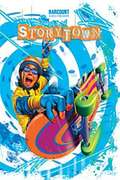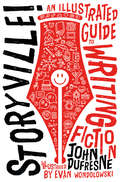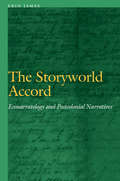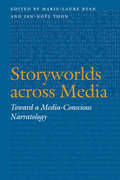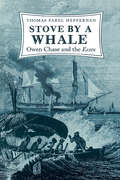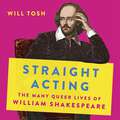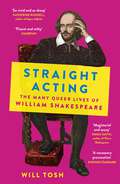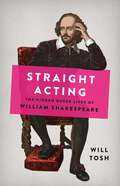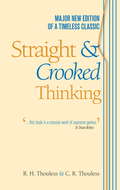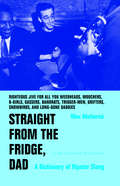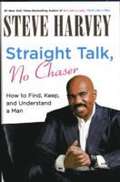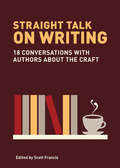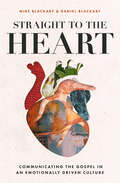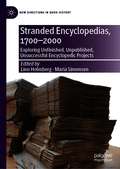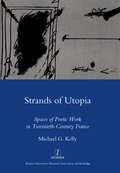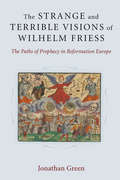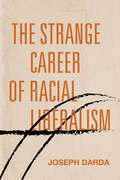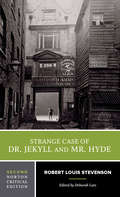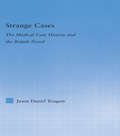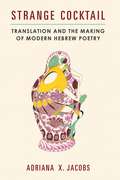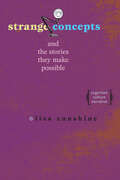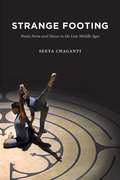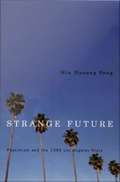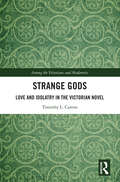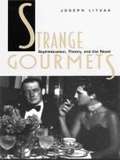- Table View
- List View
Storytown: Ride the Edge [Grade 5]
by Isabel L. Beck Roger C. Farr Dorothy S. StricklandNIMAC-sourced textbook
Storyville!: An Illustrated Guide To Writing Ficiton
by John DufresneA smart and funny guide to writing fiction, with engaging infographics that bring storytelling techniques to life. Whether you are daunted by a blinking cursor or frustrated trying to get the people in your head onto the page, writing stories can be intimidating. It takes passion, tenacity, patience, and a knowledge of?and faith in?the often-digressive writing process. A do-it-yourself manual for the apprentice fiction writer, Storyville! demystifies that process; its bold graphics take you inside the writer’s comfortingly chaotic mind and show you how stories are made. In Storyville!, seasoned guide John Dufresne?whose approach “will anchor the newbie and entertain the veteran” (San Francisco Chronicle)?provides practical insight into the building blocks of fiction, including how to make the reader see your characters, create a suspenseful plot, and revise, revise, revise. Storyville! is a combination handbook and notebook, with original prompts and exercises crafted with Dufresne’s singular dry wit and Evan Wondolowski’s playful and illuminating graphics on every page.
The Storyworld Accord: Econarratology and Postcolonial Narratives (Frontiers of Narrative)
by Erin James“Storyworlds,” mental models of context and environment within which characters function, is a concept used to describe what happens in narrative. Narratologists agree that the concept of storyworlds best captures the ecology of narrative interpretation by allowing a fuller appreciation of the organization of both space and time, by recognizing reading as a process that encourages readers to compare the world of a text to other possible worlds, and by highlighting the power of narrative to immerse readers in new and unfamiliar environments. Focusing on the work of writers from Trinidad and Nigeria, such as Sam Selvon and Ben Okri, The Storyworld Accord investigates and compares the storyworlds of nonrealist and postmodern postcolonial texts to show how such narratives grapple with the often-collapsed concerns of subjectivity, representation, and environment, bringing together these narratological and ecocritical concerns via a mode that Erin James calls econarratology. Arguing that postcolonial ecocriticism, like ecocritical studies, has tended to neglect imaginative representations of the environment in postcolonial literatures, James suggests that readings of storyworlds in postcolonial texts helps narrative theorists and ecocritics better consider the ways in which culture, ideologies, and social and environmental issues are articulated in narrative forms and structures, while also helping postcolonial scholars more fully consider the environment alongside issues of political subjectivity and sovereignty.
Storyworlds across Media: Toward a Media-Conscious Narratology (Frontiers of Narrative)
by Marie-Laure Ryan Jan-Noël ThonThe proliferation of media and their ever-increasing role in our daily life has produced a strong sense that understanding media—everything from oral storytelling, literary narrative, newspapers, and comics to radio, film, TV, and video games—is key to understanding the dynamics of culture and society. Storyworlds across Media explores how media, old and new, give birth to various types of storyworlds and provide different ways of experiencing them, inviting readers to join an ongoing theoretical conversation focused on the question: how can narratology achieve media-consciousness? The first part of the volume critically assesses the cross- and transmedial validity of narratological concepts such as storyworld, narrator, representation of subjectivity, and fictionality. The second part deals with issues of multimodality and intermediality across media. The third part explores the relation between media convergence and transmedial storyworlds, examining emergent forms of storytelling based on multiple media platforms. Taken together, these essays build the foundation for a media-conscious narratology that acknowledges both similarities and differences in the ways media narrate.
Stove by a Whale: Owen Chase and the Essex
by Thomas Farel HeffernanThe &“exciting tale&” of the first documented sinking of a ship by a whale—and the survivor&’s narrative that inspired Moby-Dick (Choice). &“On November 20, 1820, a great whale rammed the Nantucket whaler Essex, two thousand miles west of Ecuador. Owen Chase, her first mate, and twenty-nine other men took to the boats; eight eventually survived. Herman Melville&’s debt to Chase&’s Narrative has been known since Moby-Dick appeared, but little has been known about Chase and the survival of the crew . . .&“Heffernan&’s study belongs on the shelf of every Melville scholar and anyone interested in an exciting tale.&” —Choice&“Moving . . . [Hefferman] has brought together new information about the Essex and her crew, the rescue of her survivors, and subsequent accounts of their ordeal that goes far beyond any single study previously in print.&” —Resources for American Literary Study&“The astonishing list of books, logs, manuscripts, court records, ships&’ registers, and museum records attest to the diligent weeks, months, and even years that have finally resulted in a volume that entrances the reader with yarns of the sea. All the drama is still there, intact.&” —OceanIncludes illustrations.
Straight Acting: The Many Queer Lives of William Shakespeare
by Will Tosh'Engrossing, enlightening and hugely entertaining'SARAH WATERS, author of Fingersmith'Brilliant - so vivid and so sharp, fantastically clever and consistently fascinating'KATHERINE RUNDELL, author of Super-InfiniteWas Shakespeare gay? The answer is both simpler and more complex than you might think . . .Shakespeare's work was profoundly influenced by the queer culture of his time - much of it totally integrated into mainstream society. From a relentless schooling in Latin and Greek homoeroticism, to a less formal education on the streets and in smoky taverns, from the gender-bending of the early comedies to the astonishingly queer literary scene that nurtured Shakespeare's sonnets, this is a story of artistic development and of personal crisis.Straight Acting is a surprising portrait of Shakespeare's queer lives - his own and those in his plays and poems. It is a journey back in time and through Shakespeare's England, revealing a culture that both endorsed and supressed same-sex desire. It is a call to stop making Shakespeare act straight and to recognise how queerness powerfully shaped the life and career of the world's most famous playwright.'Magisterial and saucy . . . This fresh account kickstarts the queer canon of English literature: Shakespeare won't go back in the closet again'EMMA SMITH, author of This Is Shakespeare
Straight Acting: The Many Queer Lives of William Shakespeare
by Will Tosh'Engrossing, enlightening and hugely entertaining'SARAH WATERS, author of Fingersmith'Brilliant - so vivid and so sharp, fantastically clever and consistently fascinating'KATHERINE RUNDELL, author of Super-InfiniteWas Shakespeare gay? The answer is both simpler and more complex than you might think . . .Shakespeare's work was profoundly influenced by the queer culture of his time - much of it totally integrated into mainstream society. From a relentless schooling in Latin and Greek homoeroticism, to a less formal education on the streets and in smoky taverns, from the gender-bending of the early comedies to the astonishingly queer literary scene that nurtured Shakespeare's sonnets, this is a story of artistic development and of personal crisis.Straight Acting is a surprising portrait of Shakespeare's queer lives - his own and those in his plays and poems. It is a journey back in time and through Shakespeare's England, revealing a culture that both endorsed and supressed same-sex desire. It is a call to stop making Shakespeare act straight and to recognise how queerness powerfully shaped the life and career of the world's most famous playwright.'Magisterial and saucy . . . This fresh account kickstarts the queer canon of English literature: Shakespeare won't go back in the closet again'EMMA SMITH, author of This Is Shakespeare
Straight Acting: The Hidden Queer Lives of William Shakespeare
by Will ToshA dazzling and "highly readable" (Guardian) portrait of Shakespeare as a young artist, revealing how his rich and complex queer life informed the plays and poems we treasure today &“Was Shakespeare gay?&” For years the question has sent experts and fans into a tailspin of confusion. But as scholar Will Tosh argues, this debate misses the point: sex, intimacy, and identity in Elizabethan England were infinitely more complex—and queer—than we have been taught. In this incisive biography, Tosh reveals William Shakespeare as a queer artist who drew on his society&’s nuanced understanding of gender and sexuality to create some of English literature&’s richest works. During Shakespeare&’s time, same-sex desire was repressed and punished by the Church and state, but it was also articulated and sustained by institutions across England. Moving through the queer spaces of Shakespeare&’s life—his Stratford schoolroom, smoky London taverns and playhouses, the royal court—Tosh shows how strongly Shakespeare&’s early work was influenced by the queer culture of the time, much of it totally integrated into mainstream society. He also uncovers the surprising reason why Shakespeare veered away from his early work&’s gender-bending homoeroticism. Offering a subversive sketch of Elizabethan England, Straight Acting uncovers Shakespeare as one of history&’s great queer artists and completely reshapes the way we understand his life and times.
Straight and Crooked Thinking
by Robert Henry ThoulessThis new edition of a timeless classic demonstrates how the use of clear, rational thinking and logic can win any argument, however emotionally charged the topic in question. It describes the typical flaws of reasoning in argument and shows how language can be used to deceive - and how to avoid being deceived. It will show you how, by learning what is 'straight', rational language, and clear thought, you can disentangle emotionally charged rhetoric and hold your own in any argument or debate, no matter how challenging. Although written nearly 80 years ago, this book proves that certain principles remain timeless; it has shown many thousands over the decades how to cope with media spin and distorted reasoning - and now it will do the same for you.
Straight from the Fridge, Dad: A Dictionary of Hipster Slang
by Max DecharneRighteous jive for all you weedheads, moochers, b-girls, gassers, bandrats, triggermen, grifters, snowbirds, and long-gone daddies.Much of the slang popularly associated with the hippie generation of the 1960s actually dates back to before World War II, hijacked in the main from jazz and blues street expressions, mostly relating to drugs, sex, and drinking. Why talk when you can beat your chops, why eat when you can line your flue, and why snore when you can call some hogs? You’re not drunk–you’re just plumb full of stagger juice, and your skin isn’t pasty, it’s just caf? sunburn. Need a black coffee? That’s a shot of java, nix on the moo juice.Containing thousands of examples of hipster slang drawn from pulp novels, classic noir and exploitation films, blues, country, and rock ’n’ roll lyrics, and other related sources from the 1920s to the 1960s, Straight from the Fridge, Dad is the perfect guide for all hep cats and kittens. Think of it as a sort of Thirty Days to a More Powerful Vocabulary for the beret-wearing, bongo-banging set. Solid, Jackson.
Straight Talk, No Chaser: How to Find, Keep, and Understand a Man
by Steve HarveyIn the instant number one New York Times bestseller Act Like a Lady, Think Like a Man, Steve Harvey gave millions of women around the globe insight into what men really think about love, intimacy, and commitment. In his new book he zeros in on what motivates men and provides tips on how women can use that knowledge to get more of what they need out of their relationships, whether it's more help around the house, more of the right kind of attention in the bedroom, more money in the joint bank account, or more truth when it comes to the hard questions, such as: Are you committed to building a future together? Does my success intimidate you? Have you cheated on me? In Straight Talk, No Chaser: How to Find, Keep, and Understand a Man, Steve Harvey shares information on: How to Get the Truth Out of Your Man * Tired of answers that are deceptive? Harvey lays out a three-tier, CIA-style of questioning that will leave your man no choice but to cut to the chase and deliver the truth. Dating Tips, Decade by Decade * Whether you're in your twenties and just starting to date seriously, in your thirties and feeling the tick of the biological clock, or in your forties and beyond, Steve provides insight into what a man, in each decade of his life, is looking for in a mate. How to Minimize Nagging and Maximize Harmony at Home * He said he'd cut the lawn on Saturday, and you may have been within reason to think that that meant Saturday before ten in the evening, but exploding at him is only going to ruin the mood for everyone, which means no romance. Steve shows you how to talk to your man in a way that moves him to action and keeps the peace. And there's much more, including Steve's candid answers to questions you've always wanted to ask men. Drawing on a lifetime of experience and the feedback women have shared with him in reaction to Act Like a Lady, Think Like a Man, Harvey offers wisdom on a wealth of topics relevant to both sexes today. He also gets more personal, sharing anecdotes from his own family history. Always direct, often funny, and incredibly perceptive, media personality, comedian, philanthropist, and (finally) happily married husband, Steve Harvey proves once again that he is the king of relationships.
Straight Talk on Writing: 20 Conversations with Authors about the Craft
by Scott FrancisThis compelling book provides you with eighteen insightful interviews with bestselling authors, writing instructors, agents, award-winning writers and more. Youll learn how to create characters, plot more effectively, live the writers life with purpose and abandon, and much more. Interviewees include Orson Scott Card, George Singleton, Donald Maass, Dinty Moore, Peter Selgin, James Alexander Thom, and many more. The interviews are casual, relaxed, revealing and instructive. Dig in
Straight to the Heart: Communicating the Gospel in an Emotionally Driven Culture
by Daniel Blackaby Mike BlackabyOur approach to apologetics needs to change when the very idea of &“truth&” is controversial. But as authors Daniel Blackaby and Mike Blackaby teach us, we can still reach people if we understand what they value most. This practical guide to our current landscape explores five effective communication pathways: Story: As people wired for narrative, we can speak through the stories we live and tell. Beauty: In an increasingly industrialized world, we can point people to &“pockets of beauty&” that reveal the attractiveness of God. Art: In a society that celebrates the arts, we can cultivate creativity in the church, then send artists out as cultural missionaries. Desire: To a people motivated by love, identity, and purpose, we can show how Jesus is the perfect fulfillment of our deepest longings.Community: As relational creatures where connectivity is disappearing, we can offer a community of unified diversity. Culture may be in flux, but God&’s Word remains true. Straight to the Heart helps us speak to the passions that drive our culture without compromising the life-changing truth of the gospel.
Stranded Encyclopedias, 1700–2000: Exploring Unfinished, Unpublished, Unsuccessful Encyclopedic Projects (New Directions in Book History)
by Linn Holmberg Maria SimonsenIn Stranded Encyclopedias, 1700–2000: Exploring Unfinished, Unpublished, Unsuccessful Encyclopedic Projects, fourteen scholars turn to the archives to challenge the way the history of modern encyclopedism has long been told. Rather than emphasizing successful publications and famous compilers, they explore encyclopedic enterprises that somehow failed. With a combined attention to script, print, and digital cultures, the volume highlights the many challenges facing those who have pursued complete knowledge in the past three hundred years. By introducing the concepts of stranded and strandedness, it also provides an analytical framework for approaching aspects often overlooked in histories of encyclopedias, books, and learning: the unpublished, the unfinished, the incomplete, the unsuccessfully disseminated, and the no-longer-updated. By examining these aspects in a new and original way, this book will be of value to anyone interested in the history of encyclopedism and lexicography, the history of knowledge, language, and ideas, and the history of books, writing, translating, and publishing. Chapters 1 and 4 are available open access under a Creative Commons Attribution 4.0 International License via link.springer.com.
Strands of Utopia: Spaces of Poetic Work in Twentieth Century France
by Michael G Kelly"The poetic is an abiding yet elusive qualification within the discursive system of twentieth-century French literature. No longer amenable to formal assignment, its recurrences delimit a shifting, multi-layered practice of artistic and intellectual (self-) invention. This study attempts to outline certain durable properties of that practice by confronting it with the complex theoretical and spatial metaphor of utopia. Drawing, in particular, upon the oeuvres of Victor Segalen (1878-1919), Rene Daumal (1908-44) and Yves Bonnefoy (b. 1923), it traces poetic work - work done in support of poetic difference - along the social, physical and textual axes of what is argued to be a sustained and radically inclusive utopian practice within the literary field. The complex utopian quality of poetic work is linked to the cultural persistence of the poetic as a simple attribute within literary practice. In uncovering this link, the study encourages revised understandings of both the poetic and the utopian in the modern French literary context."
The Strange and Terrible Visions of Wilhelm Friess: The Paths of Prophecy in Reformation Europe
by Jonathan GreenAlthough nearly forgotten today, the prophetic writing of Wilhelm Friess was the most popular work of its kind in Germany in the second half of the sixteenth century. While the author "Wilhelm Friess" was a convenient fiction, his text had a long and remarkable history as it moved from the papal court in fourteenth-century Avignon, to Antwerp under Habsburg oppression, to Nuremberg as it was still reeling from Lutheran failures in the Schmalkaldic War, and then back to Antwerp at the outbreak of the Dutch revolt. Dutch scholars have recognized that Frans Fraet was executed for printing a prognostication by Willem de Vriese, but this prognostication was thought to be lost. A few scholars of sixteenth-century German apocalypticism have briefly noted the prophecies of Wilhelm Friess but have not studied them in depth. The Strange and Terrible Visions of Wilhelm Friess is the first to connect de Vriese and Friess, as well as recognize the prophecy of Wilhelm Friess as an adaptation of a French version of theVademecum of Johannes de Rupescissa, making these pamphlets by far the most widespread source for Rupescissa's apocalyptic thought in Reformation Germany. The book explains the connection between the first and second prophecies of Wilhelm Friess and discovers the Calvinist context of the second prophecy and its connection to Johann Fischart, one of the most important German writers of the time. Jonathan Green provides a study of how textual history interacts with print history in early modern pamphlets and proposes a model of how early modern prophecies were created and transmitted. The Strange and Terrible Visions of Wilhelm Friess makes important contributions to the study of early modern German and Dutch literature, apocalypticism and confessionalization during the Reformation, and the history of printing in the sixteenth century.
The Strange Career of Racial Liberalism (Post*45)
by Joseph DardaHow Americans learned to wait on time for racial change What if, Joseph Darda asks, our desire to solve racism—with science, civil rights, antiracist literature, integration, and color blindness—has entrenched it further? In The Strange Career of Racial Liberalism, he traces the rise of liberal antiracism, showing how reformers' faith in time, in the moral arc of the universe, has undercut future movements with the insistence that racism constitutes a time-limited crisis to be solved with time-limited remedies. Most historians attribute the shortcomings of the civil rights era to a conservative backlash or to the fracturing of the liberal establishment in the late 1960s, but the civil rights movement also faced resistance from a liberal "frontlash," from antiredistributive allies who, before it ever took off, constrained what the movement could demand and how it could demand it. Telling the stories of Ruth Benedict, Kenneth Clark, W. E. B. Du Bois, John Howard Griffin, Pauli Murray, Lillian Smith, Richard Wright, and others, Darda reveals how Americans learned to wait on time for racial change and the enduring harm of that trust in the clock.
The Strange Case of Dr. Jekyll and Mr. Hyde (Norton Critical Editions #0)
by Robert Louis Stevenson“The annotations are useful, particularly for references to biblical and other literary allusions. [The contexts] section is essential to alerting students to the many subtexts/contexts of the story.” —MARIA CARRIG, Carthage College This Norton Critical Edition includes: The first British edition of the novel, published in 1886 by Longmans, Green, and Co., the only edition set directly from Stevenson’s manuscript and for which he read and corrected proofs. Deborah Lutz’s thorough introduction and detailed explanatory footnotes to the novel. Seven illustrations. A rich and relevant selection of background materials centered on the novel’s composition, reception, and historical and cultural contexts, alongside seven of Stevenson’s letters. Interpretative essays by Elaine Showalter, Jack Halberstam, Martin Danahay, and Stephen Arata. A chronology and a selected bibliography. About the Series Read by more than 12 million students over fifty-five years, Norton Critical Editions set the standard for apparatus that is right for undergraduate readers. The three-part format—annotated text, contexts, and criticism—helps students to better understand, analyze, and appreciate the literature, while opening a wide range of teaching possibilities for instructors. Whether in print or in digital format, Norton Critical Editions provide all the resources students need.
Strange Cases: The Medical Case History and the British Novel (Literary Criticism and Cultural Theory)
by Jason TougawStrange Cases is the story of the mutual influence of the case history and the British novel during the eighteenth and nineteenth centuries. Fictions from Defoe's Roxana to James's The Turn of the Screw and case histories from George Cheyne's to Sigmund Freud's have found narrative impetus in pathology. The writer of a case history faces a rhetorical bind unique to the human sciences: the need to display the acumen of a scientist and the sympathy warranted to the suffering patient. Repeatedly, case historians justify their publicizing of extreme, often morbid or perverse, states of mind and body by appealing to readers to take pity on patients and to recognize the narrative as a vital social document. Diagnosis and sympathy, explicit rhetorical modes in case histories, operate implicitly in novels, shaping reader-identification. While these two narrative forms set out to fulfill an Enlightenment drive to classify and explain, they also raise social and epistemological questions that challenge some of the Enlightenment's most cherished ideals, including faith in reason, the perfectibility of humankind, and the stability of truth.
Strange Cocktail: Translation and the Making of Modern Hebrew Poetry (Michigan Studies In Comparative Jewish Cultures)
by Adriana X. JacobsFor centuries, poets have turned to translation for creative inspiration. Through and in translation, poets have introduced new poetic styles, languages, and forms into their own writing, sometimes changing the course of literary history in the process. Strange Cocktail is the first comprehensive study of this phenomenon in modern Hebrew literature of the late nineteenth century to the present day. Its chapters on Esther Raab, Leah Goldberg, Avot Yeshurun, and Harold Schimmel offer close readings that examine the distinct poetics of translation that emerge from reciprocal practices of writing and translating. Working in a minor literary vernacular, the translation strategies that these poets employed allowed them to create and participate in transnational and multilingual poetic networks. Strange Cocktail thereby advances a comparative and multilingual reframing of modern Hebrew literature that considers how canons change and are undone when translation occupies a central position—how lines of influence and affiliation are redrawn and literary historiographies are revised when the work of translation occupies the same status as an original text, when translating and writing go hand in hand.
Strange Concepts and the Stories They Make Possible: Cognition, Culture, Narrative
by Lisa ZunshineIn this fresh and often playful interdisciplinary study, Lisa Zunshine presents a fluid discussion of how key concepts from cognitive science complicate our cultural interpretations of "strange" literary phenomena.From Short Circuit to I, Robot, from The Parent Trap to Big Business, fantastic tales of rebellious robots, animated artifacts, and twins mistaken for each other are a permanent fixture in popular culture and have been since antiquity. Why do these strange concepts captivate the human imagination so thoroughly? Zunshine explores how cognitive science, specifically its ideas of essentialism and functionalism, combined with historical and cultural analysis, can help us understand why we find such literary phenomena so fascinating.Drawing from research by such cognitive evolutionary anthropologists and psychologists as Scott Atran, Paul Bloom, Pascal Boyer, and Susan A. Gelman, Zunshine examines the cognitive origins of the distinction between essence and function and how unexpected tensions between these two concepts are brought into play in fictional narratives. Discussing motifs of confused identity and of twins in drama, science fiction’s use of robots, cyborgs, and androids, and nonsense poetry and surrealist art, she reveals the range and power of key concepts from science in literary interpretation and provides insight into how cognitive-evolutionary research on essentialism can be used to study fiction as well as everyday strange concepts.
Strange Footing: Poetic Form and Dance in the Late Middle Ages
by Seeta ChagantiFor premodern audiences, poetic form did not exist solely as meter, stanzas, or rhyme scheme. Rather, the form of a poem emerged as an experience, one generated when an audience immersed in a culture of dance encountered a poetic text. Exploring the complex relationship between medieval dance and medieval poetry, Strange Footing argues that the intersection of texts and dance produced an experience of poetic form based in disorientation, asymmetry, and even misstep. Medieval dance guided audiences to approach poetry not in terms of the body’s regular marking of time and space, but rather in the irregular and surprising forces of virtual motion around, ahead of, and behind the dancing body. Reading medieval poems through artworks, paintings, and sculptures depicting dance, Seeta Chaganti illuminates texts that have long eluded our full understanding, inviting us to inhabit their strange footings askew of conventional space and time.Strange Footing deploys the motion of dance to change how we read medieval poetry, generating a new theory of poetic form for medieval studies and beyond.
Strange Future: Pessimism and the 1992 Los Angeles Riots
by Min Hyoung SongSometime near the start of the 1990s, the future became a place of national decline. The United States had entered a period of great anxiety fueled by the shrinking of the white middle class, the increasingly visible misery of poor urban blacks, and the mass immigration of nonwhites. Perhaps more than any other event marking the passage through these dark years, the 1992 Los Angeles riots have sparked imaginative and critical works reacting to this profound pessimism. Focusing on a wide range of these creative works, Min Hyoung Song shows how the L. A. riots have become a cultural-literary event--an important reference and resource for imagining the social problems plaguing the United States and its possible futures. Song considers works that address the riots and often the traumatic place of the Korean American community within them: the independent documentary Sa-I-Gu (Korean for April 29, the date the riots began), Chang-rae Lee's novel Native Speaker, the commercial film Strange Days, and the experimental drama of Anna Deavere Smith, among many others. He describes how cultural producers have used the riots to examine the narrative of national decline, manipulating language and visual elements, borrowing and refashioning familiar tropes, and, perhaps most significantly, repeatedly turning to metaphors of bodily suffering to convey a sense of an unraveling social fabric. Song argues that these aesthetic experiments offer ways of revisiting the traumas of the past in order to imagine more survivable futures.
Strange Gods: Love and Idolatry in the Victorian Novel (Among the Victorians and Modernists)
by Timothy L. CarensDespite frequent declarations of the sanctity of love and marriage, British Protestant culture nurtured the fear that human affection might easily slip into idolatry. Throughout the nineteenth-century, theological essays, sermons, hymns, and didactic fiction and poetry urged the faithful to maintain a constant watch over their hearts, lest they become engrossed by human love, guilty of worshipping the creature rather than the Creator. Strange Gods: Love and Idolatry in the Victorian Novel traces the concerns produced in Protestant culture by this broad interpretation of idolatry. In chapters focusing on Charles Kingsley and Charlotte Brontë, Mary Elizabeth Braddon, George Eliot, Oscar Wilde, and Thomas Hardy, this volume shows that even supposedly secular novels obsessively reenact an ideological clash between Protestant faith and human love. Anxiety about adoring humans more than God frequently overshadows and sometimes derails the progress of romance in Victorian novels. By probing this anxiety and its narrative effects, Strange Gods uncovers how a central Protestant belief exerts its influence over stories about love and marriage.
Strange Gourmets: Sophistication, Theory, and the Novel
by Joseph LitvakTheoretically sophisticated: How often has this term been used to distinguish a work of contemporary criticism, and what, exactly, does it mean? In Strange Gourmets, Joseph Litvak reclaims sophistication from its negative connotations and turns the spotlight on those who, even as they demonize sophistication, surreptitiously and extensively use it.Though commonly thought of as a kind of worldliness at its best and an elitist snobbery at its worst, sophistication, Litvak reminds us, remains tied to its earlier, if forgotten, meaning of "perversion"--a perversion whose avatars are the homosexual and the intellectual. Proceeding with his investigations from a specifically gay academic perspective, Litvak presents thoroughly inventive readings of novels by Austen, Thackeray, and Proust, and of theoretical works by Adorno and Barthes, each text epitomizing sophistication in one of its more familiar modes. Among the issues he explores are the ways in which these texts teach sophistication, the embarrassment that sophistication causes the sophisticated, and how the class politics of sophistication are inseparable from its sexual politics. Helping gay, queer, feminist, and other provocative critics to make the most of their bad publicity, Litvak mindfully celebrates sophistication's economy of taste and pleasure.
